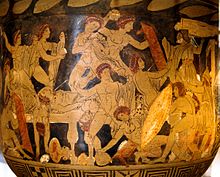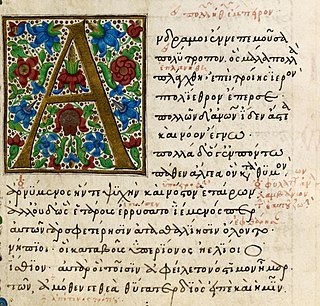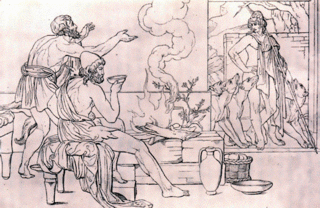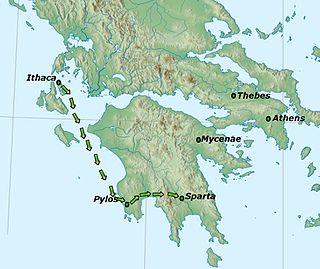
In Greek mythology, the suitors of Penelope (also known in Latin as the Proci) are one of the main subjects of Homer's Odyssey .

In Greek mythology, the suitors of Penelope (also known in Latin as the Proci) are one of the main subjects of Homer's Odyssey .

In the Odyssey, Homer describes Odysseus' journey home from Troy. Prior to the Trojan War, Odysseus was King of Ithaca, a Greek island known for its isolation and rugged terrain. [1] When he departs from Ithaca to fight for the Greeks in the war, he leaves behind a newborn child, Telemachus, and his wife, Penelope. Although most surviving Greek soldiers return shortly after the end of the fighting, Odysseus does not return to Ithaca until ten years after the end of the Trojan War.
During Odysseus' long absence, unmarried young men start to suspect that Odysseus died in Troy or on the journey home. Under the pretense of courting Penelope, these youths, called "the suitors", take up residence in Odysseus' home and vie for her hand in marriage. Rather than simply rejecting the suitors, Penelope devises a plan to delay their courtship. She claims she will choose a husband after she has finished weaving a funeral shroud to present to Odysseus' father, Laertes. For three years, Penelope weaves the shroud during the day and unravels it at night, awaiting her husband's return. The suitors learn of Penelope's delaying tactic when one of her maidservants, Melantho, reveals it to her lover Eurymachus. Upon finding out, the suitors demand that she choose a husband from among them.

The suitors behave badly in Odysseus' home, drinking his wine and eating his food. Odysseus' son, Telemachus, now a young man, is frustrated with the suitors. Telemachus laments to Athena (disguised as Mentes, one of Odysseus' guest-friends) about the suitors' behavior. In return, Athena urges Telemachus to stand up to the suitors and set out in search of his father. [2]
Once Odysseus returns home (after Athena initially disguises him as a beggar so he can plot his revenge in secret), his son Telemachus tells him that there are 108 suitors: 52 from Dulichium, 24 from Same, 20 Achaeans from Zacynthus, and 12 from Ithaca. [3] Together, Odysseus, Telemachus, Eumaeus and Philoetius kill the suitors and the disloyal maidservants. For reasons of oral presentation (i.e., a memory aid), the suitors are usually listed in the same order throughout the Odyssey. [4]
Although there are many suitors, three are particularly important to the narrative of the epic.
Antinous, son of Eupheithes, is the first of the suitors to speak in the epic and the first to die upon Odysseus' return. [5] [6] Antinous is the most disrespectful of the suitors and is the one who devises a plan to murder Telemachus upon his return to Ithaca. [7] Although his plan is vetoed by Amphinomus, Antinous continues to behave arrogantly. He encourages the fight between beggar-Odysseus and the beggar Irus. When Odysseus finally returns home, disguised as a beggar, Antinous does not show him hospitality, throwing a stool at beggar-Odysseus. [8]
Eurymachus, son of Polybus, is the second of the suitors to appear in the epic. Eurymachus acts as a leader among the suitors because of his charisma. He is noted to be the most likely to win Penelope's hand because her father and brothers support the union and because he outdoes the other suitors in gift-giving. [9] Although he is charismatic, Eurymachus is deceitful. He discovers Penelope's plot because he is having an affair with one of Penelope's maidservants, Melantho. [10] Eurymachus also throws a stool at Odysseus. Further, when Odysseus reveals himself to the suitors, Eurymachus attempts to avoid punishment for the suitors' misdeeds by blaming them all on Antinous. [6]
Amphinomus, son of King Nisos, is the most sympathetic of the suitors. Amphinomus attempts twice to dissuade the suitors from murdering Telemachus. Odysseus recognizes this and attempts to warn Amphinomus to leave the home before the final battle. Despite this, Amphinomus stays and dies along with the other suitors.
While most of the suitors are not dealt with individually by Homer, some are mentioned by name and play more or less significant roles in the poem. Among them are:
An extensive list of Penelope's suitors is given in the Bibliotheca . [27] This source does not appear to fully respect the Homeric tradition, as the numbers are different and not all of those named in the Odyssey appear in the Bibliotheca. Due to the text being damaged, some of the names are repeated several times and the lists for Dulichium and Zacynthus actually contain fewer names than the given figures suggest.
57 suitors from Dulichium
23 from Same
44 from Zacynthus
12 from Ithaca
{{cite book}}: CS1 maint: others (link){{cite book}}: CS1 maint: others (link){{cite book}}: CS1 maint: others (link){{cite book}}: CS1 maint: others (link){{cite book}}: CS1 maint: others (link)
The Odyssey is one of two major ancient Greek epic poems attributed to Homer. It is one of the oldest extant works of literature still widely read by modern audiences. As with the Iliad, the poem is divided into 24 books. It follows the Greek hero Odysseus, king of Ithaca, and his journey home after the Trojan War. After the war, which lasted ten years, his journey from Troy to Ithaca, via Africa and southern Europe, lasted for ten additional years during which time he encountered many perils and all of his crewmates were killed. In his absence, Odysseus was assumed dead, and his wife Penelope and son Telemachus had to contend with a group of unruly suitors who were competing for Penelope's hand in marriage.

Penelope is a character in Homer's Odyssey. She was the queen of Ithaca and was the daughter of Spartan king Icarius and Asterodia. Penelope is known for her fidelity to her husband Odysseus, despite the attention of more than a hundred suitors during his absence. In one source, Penelope's original name was Arnacia or Arnaea.

Telemachus, in Greek mythology, is the son of Odysseus and Penelope, who is a central character in Homer's Odyssey. When Telemachus reached manhood, he visited Pylos and Sparta in search of his wandering father. On his return to Ithaca, he found that Odysseus had reached home before him. Then father and son slew the suitors who had gathered around Penelope. According to later tradition, Telemachus married Circe after Odysseus’ death.
In Greek mythology and history, there were at least eleven men named Medon.
In Greek mythology, Amphinomus may refer to the following personages:

In Greek mythology, Eumaeus was Odysseus' slave, swineherd, and friend. His father, Ctesius, son of Ormenus, was king of an island called Syra, although it has also been suggested that Eumaeus may have referred to Syracuse, Sicily.
Clytius, also spelled Klythios, Klytios, Clytios, and Klytius, is the name of multiple people in Greek mythology:

The Telemachy is a term traditionally applied to the first four books of Homer's epic poem the Odyssey. They are named so because, just as the Odyssey tells the story of Odysseus, they tell the story of Odysseus's son Telemachus as he journeys from home for the first time in search of news about his missing father.

The Odyssey is a 1997 American mythology–adventure television miniseries based on the ancient Greek epic poem by Homer, the Odyssey. Directed by Andrei Konchalovsky, the miniseries aired in two parts beginning on May 18, 1997, on NBC. It was filmed in Malta, Turkey, parts of England and many other places around the Mediterranean, where the story takes place. The cast includes Armand Assante, Greta Scacchi, Irene Papas, Isabella Rossellini, Bernadette Peters, Eric Roberts, Geraldine Chaplin, Jeroen Krabbé, Christopher Lee and Vanessa Williams.
In the Epic Cycle, Antinous or Antinoös, was the Ithacan son of Eupeithes, best known for his role in Homer's Odyssey.
Dulichium, also called Dolicha or Doliche, was a place noted by numerous ancient writers that was either a city on, or an island off, the Ionian Sea coast of Acarnania, Greece.

Same, also Samos (Σάμος) is an Ancient Greek name of a Homeric island in the Ionian Sea, near Ithaca and Cephalonia. In Homer's Odyssey Same is described as part of Odysseus's kingdom together with Ithaca, Dulichium, and Zacynthus. The Iliad, book II, in the Catalogue of Ships, contains a different list of islands comprising Odysseus's kingdom. Same is included together with Ithaca, Neritum, Krocylea, Aegilips and Zacynthus, indicating that the "Catalogue of Ships" could be a later addition to the Iliad.

The Returns from Troy are the stories of how the Greek leaders returned after their victory in the Trojan War. Many Achaean heroes did not return to their homes, but died or founded colonies outside the Greek mainland. The most famous returns are those of Odysseus, whose wanderings are narrated in the Odyssey, and Agamemnon, whose murder at the hands of his wife Clytemnestra was portrayed in Greek tragedy.
Home Sweet Homer is a 1976 musical with a book by Roland Kibbee and Albert Marre, lyrics by Charles Burr and Forman Brown, and music by Mitch Leigh.
In Ancient Greek epic tradition recounted in Homer's Odyssey, Polybus was the father of a suitor, Eurymachus, who was killed by Odysseus once he returned from his 10-year journey during the Trojan War.
In Greek mythology, the name Ctesippus may refer to:
In Greek mythology, Polybus may refer to the following personages:
In Greek mythology, Eurymachus was an Ithacan nobleman and one of the two leading suitors of Penelope, the other being Antinous.
In Greek mythology, Melantho is one of the minor characters in the Odyssey.

Odysseus, Verbrecher. Schauspiel einer Heimkehr is a play by the Austrian writer Christoph Ransmayr, first performed in 2010. It is based on an episode toward the end of Homer's Odyssey, where Odysseus returns to his kingdom and slaughters his wife's suitors, who are called reformers in the play. Odysseus, Verbrecher was commissioned for the Ruhr.2010 campaign as one of six new plays based on the Odyssey.